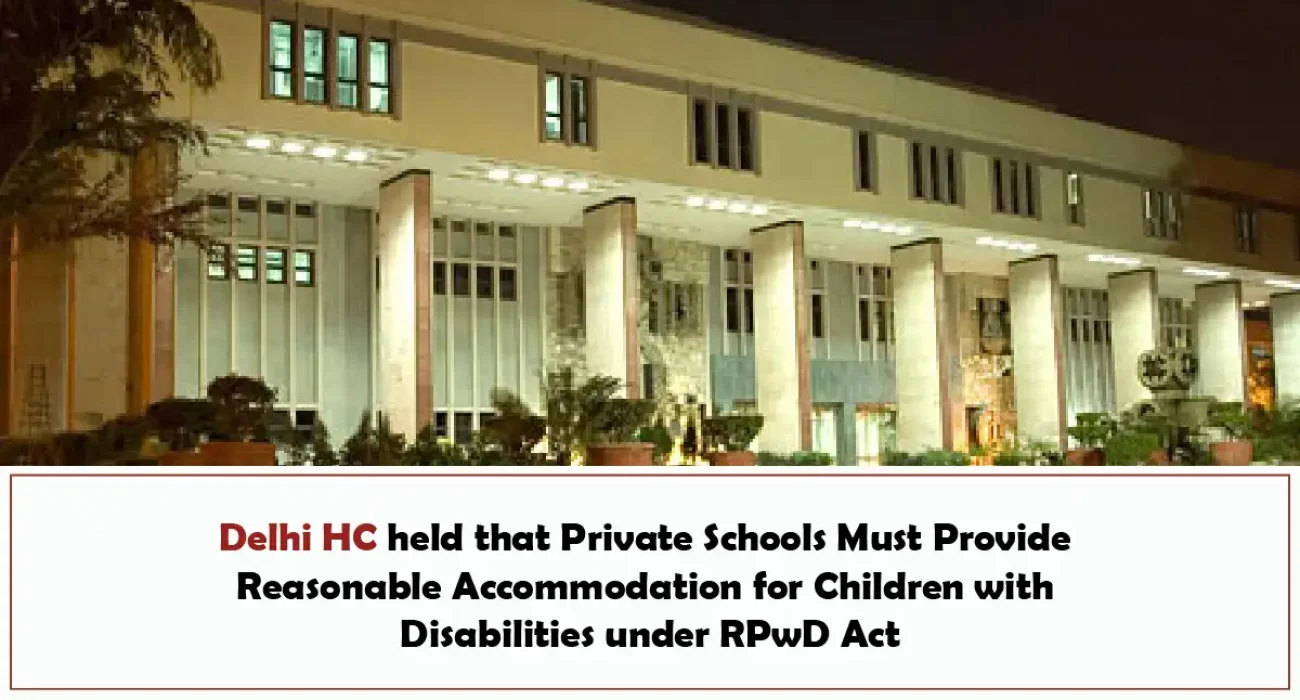

Table of Contents
ToggleThe case arose when a minor girl, born on 8 May 2017, diagnosed with mild autism, was denied readmission by GD Goenka Public School, Delhi. Initially admitted in 2021 under the “sibling clause,” her developmental delays became evident after resumption of offline classes post-Covid-19. Parents submitted medical reports and sought school support in the form of a shadow teacher, but the school refused. In January 2023, her education was discontinued, despite fees being paid till March 2023. After repeated requests and a legal notice failed, a writ petition was filed by her mother. The Single Judge directed the school to readmit the child in Class I or an age-appropriate class as a fee-paying student, with permission to attend school alongside a parent-appointed shadow teacher. The Directorate of Education (DoE) was instructed to monitor compliance. The school challenged this order through an intra-court appeal before the Delhi High Court Division Bench.
The school argued that at the time of admission, no disclosure of the child’s disability was made. According to them, this omission itself was ground for cancellation of admission. The school further claimed that the child exhibited “severe behavioural issues, including aggression towards staff and students, as well as disruptive behaviour” which raised safety concerns. They asserted that the parents voluntarily withdrew the child in December 2022 after these discussions, breaking the continuity of her education. Thus, since she was not enrolled in the 2023–24 session, her demand for readmission in 2024–25 lacked basis. The school also contended that it was in the child’s best interest to be placed in a special school rather than an integrated setting, challenging the Single Judge’s direction to continue her education in the same school with a shadow teacher.
The child’s mother argued that the school had failed to fulfil its statutory duty under the Rights of Persons with Disabilities (RPwD) Act, 2016. She emphasized that the Act mandates inclusive education and reasonable accommodation for children with disabilities. She relied on expert medical opinion, particularly from Sir Ganga Ram Hospital, which stated the child was capable of thriving in an integrated system with proper support. The refusal of the school to provide necessary pedagogical adjustments and a shadow teacher was portrayed as discriminatory and contrary to Sections 3 and 16 of the RPwD Act. The writ petition thus sought the child’s readmission in an age-appropriate class with necessary accommodations.
The Division Bench, led by Chief Justice DK Upadhyaya and Justice Tushar Rao Gedela, upheld the Single Judge’s order. The Court strongly criticized the school’s stance, observing that “Having regard to the purpose, object and scheme of RPwD Act coupled with the observations of the Hon’ble Supreme Court in Avni Prakash, it is difficult to agree with the stance taken and approach adopted by the appellant/school denying admission to the child.”
The Bench endorsed the findings of the Expert Committee from IHBAS, which had recommended placement of the child in the school with the assistance of a shadow teacher. The Chairperson of the Committee emphasized that early therapeutic interventions would ensure better results and clarified that the shadow teacher was not an additional class teacher but a facilitator and motivator, essential for the child’s adjustment.
The Court highlighted that the RPwD Act creates obligations not only for government and aided institutions but also for all “recognized” institutions, including private and non-funded schools. Quoting Section 16, it stressed that “applicability of Section 16 of the RPwD Act to a completely private and non-funded educational institution cannot be denied on any count.”
The Court underlined the statutory mandate of “inclusive education” under Section 2(m), requiring children with and without disabilities to study together, with teaching adapted to diverse needs. It further noted, “Accordingly, it becomes incumbent upon the appellant/school not only to detect and recognise the learning disabilities of the child but also to take suitable pedagogical and other measures so that such a child is able to overcome such learning disabilities.”
The Division Bench rejected the school’s objections to the Expert Committee’s methodology, terming them “unfounded” and reflective of a non-cooperative approach aimed at denying the child her statutory rights. It emphasized that the RPwD Act is an embodiment of human rights, designed not just to prevent discrimination but to provide opportunities for inclusion in society.
The Court concluded that the appeal was devoid of merit. It held that “For the discussion made and reasons given above, we are in complete agreement with the judgment and order passed by the learned Single Judge which is under appeal herein and find that the appeal is unmerited.”
Accordingly, the Division Bench dismissed the school’s appeal and directed compliance with the Single Judge’s order within two weeks, ensuring the child’s readmission with reasonable accommodations. The Court clarified that costs would be “made easy.”
Written by Adv. Deeksha Rai
IAW resources
Browse our help directory